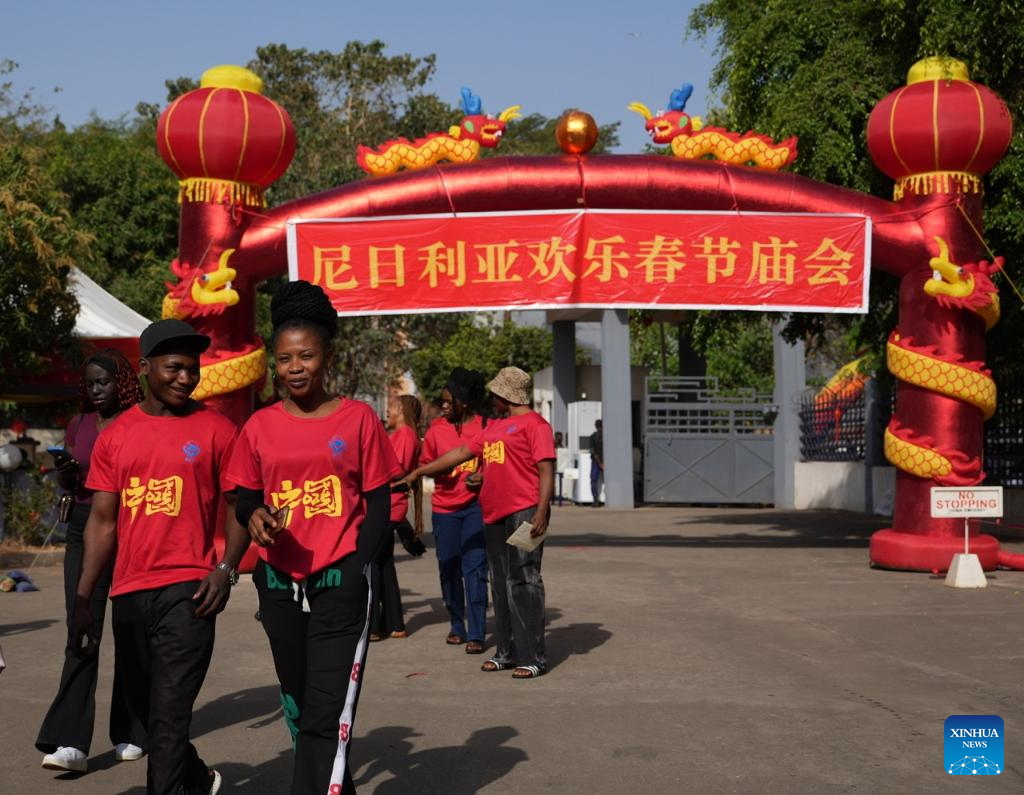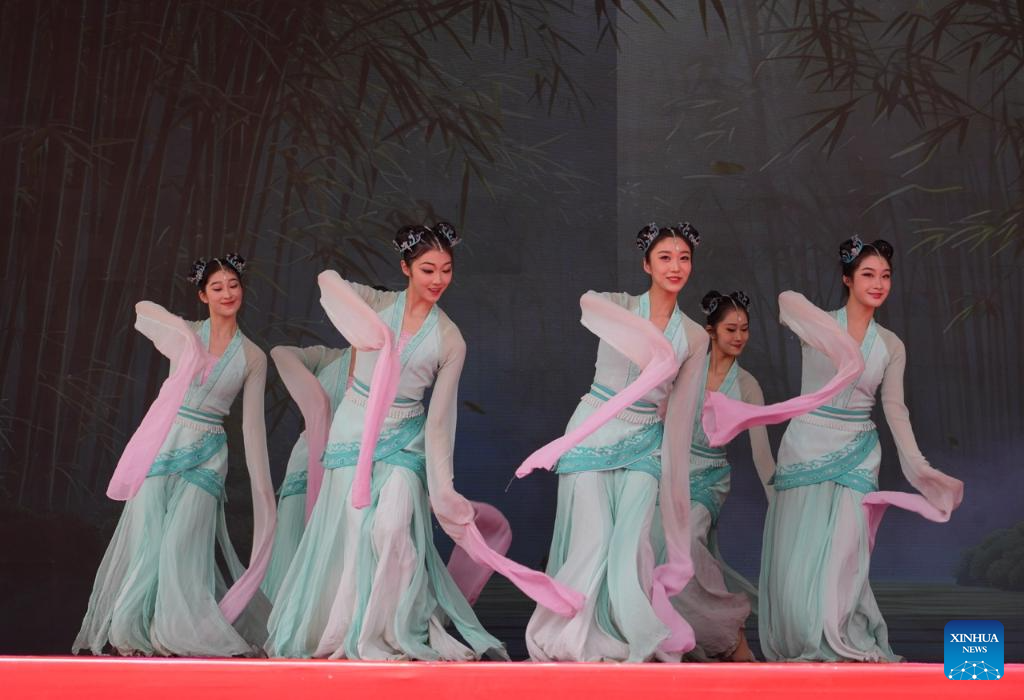
People visit a temple fair in celebration of the upcoming Spring Festival, or the Chinese Lunar New Year, in Abuja, Nigeria, Jan. 25, 2025.(Xinhua/Yang Zhe)
by Olatunji Saliu
ABUJA, Jan. 26 (Xinhua) -- The sounds of scintillating drums and vibrant melodies echoed through a mammoth crowd that gathered in the Nigerian capital of Abuja on Saturday to celebrate the start of the Chinese New Year, also known as the Spring Festival.
The Spring Festival will fall on Jan. 29 this year in accordance with the Chinese lunar calendar. Maintaining tradition and sharing their culture with Nigerian neighbors and friends, the Chinese community in Nigeria held an elaborate celebration to embrace the upcoming Year of the Snake.
"The Spring Festival is the most celebrated in China, and this year is special because we brought top artists from Beijing to provide marvelous performances. The temple fair has become a shining brand in Nigeria," Yu Dunhai, the Chinese ambassador to Nigeria, told Xinhua.
In light of the recent recognition of the festival as an Intangible Cultural Heritage of Humanity by the United Nations Educational, Scientific and Cultural Organization, Yu emphasized the cultural and diplomatic significance of the Spring Festival in Nigeria.
Through such cultural exchanges, "people get to know each other better, understand each other better, and respect each other better, laying a solid foundation for our bilateral relations to go further," he said.
As the Chinese community and their Nigerian friends openly displayed their deep friendship and cultures on Saturday at the China Cultural Center in Abuja, the venue of the celebration was a dazzling spectacle of colors, music, and flavors that brought together people from diverse backgrounds to honor one of China's most cherished traditions. Participants reveled in the cultural fusion, enjoying traditional Chinese performances, delicacies, and interactive activities that underscored the bond between the two countries.
For Charles Onunaiju, a keen observer of Nigeria-China relations, the significance of this event lies in its ability to foster deeper people-to-people ties.
"For me, it is the continuous improvement of Nigeria-China relations, especially people-to-people relations. These are the very core pillars of the Belt and Road Initiative, promoting people-to-people contact because it is understood that building people into their respective social fabric is the guarantee of continuity and future renewal of engagement," Onunaiju said.
In addition to Chinese songs and dances, local troupes and other performing arts groups added a variety of Nigerian dances to the festivities. Under branded pop-up canopies, several tables were laden with Chinese cuisines, such as Jiaozi (the Chinese dumplings), noodles, and rice cakes. Attendees flocked to sample the delicious food on display.
Tobi Afolayan, a local businessman who attended the temple fair for the first time, described it as "distinctive," noting its role in promoting mutual understanding and cultural harmony.
China's promotion of its culture is not about imposition, but shared values and appreciation, Afolayan added.
The Spring Festival has gained popularity in most cities in Nigeria due to the sense of anticipation and excitement shared by the Chinese community in the West African country for the festival and the way it is colorfully celebrated every year.
Abounding in distinctive Chinese symbols of great emotional appeal, the Spring Festival celebrations are emblematic of cultural tradition, heritage, and aesthetic aspirations. The tradition of such celebrations by the Chinese dates back more than 4,000 years and includes fireworks, Spring Festival couplets, the preparation of jiaozi, and the family reunion dinner on the eve of the New Year.
"Culture is symbolic and monumental; it is a way of life that brings people together from divergent cultural and historical backgrounds," said Sheriff Ghali Ibrahim, another participant at the colorful event.
With the increasing participation of Nigerian government officials, private sector representatives, and members of academia, the Spring Festival celebration in Nigeria continues to grow as a powerful symbol of cultural diplomacy, reflecting the shared aspirations of both countries.
For Muhammad Sulaiman, an ardent promoter of Nigeria-China cultural relations, the interesting moments of the celebration were not only the artistic performances, but the unprecedented level of interaction between Nigerians and Chinese.
"What stands out for me is the understanding that two nations and their people can stand side by side with common goals and objectives. Today, I saw people streaming in from early morning, eager to participate. The variety of food, performances, and friendly atmosphere made it an unforgettable experience," added Sulaiman, who is also the president of the China Alumni Association of Nigeria. ■

Chinese dancers perform at a temple fair in celebration of the upcoming Spring Festival, or the Chinese Lunar New Year, in Abuja, Nigeria, Jan. 25, 2025.(Xinhua/Yang Zhe)

People play a ring toss game at a temple fair in celebration of the upcoming Spring Festival, or the Chinese Lunar New Year, in Abuja, Nigeria, Jan. 25, 2025. (Xinhua/Yang Zhe)

Nigerian teachers and students pose for a group photo with Chinese paper-cutting works at a temple fair in celebration of the upcoming Spring Festival, or the Chinese Lunar New Year, in Abuja, Nigeria, Jan. 25, 2025.(Xinhua/Yang Zhe)


